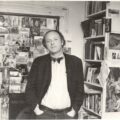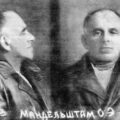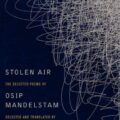Preface to Lissa Wolsak
1. It Must Be Abstract
Lissa Wolsak is a major American poet, living in Vancouver; Squeezed Light is a comprehensive gathering of her published work, which includes seven poem-sequences, a prose piece titled “An Heuristic Prolusion”, an interview, and an extended introduction by George Quasha (with Charles Stein).
“Major” is a weighty word, not to be trifled with; yet I feel confident in this case. It has become a commonplace to note that American poetry is various, fractured, “balkanized”—but if we think of the distinctive American stream in English writing, we must reckon with a single, branching river. That is, we are dealing on the one hand with the brilliant, idiosyncratic, metaphysically-ambitious, transcendental Emerson, Whitman, Dickinson—and on the other with a darker channel: the melancholic, skeptical, ironic “power of blackness” (Harry Levin’s term) represented primarily by Poe and Melville. Lissa Wolsak floats her boat where both streams merge. She is an heir to their astringent, challenging, and problematic greatness.
put me on the dune
oval
sloping
this is,
she, made, undertaken…
T.S. Eliot once famously wrote, “poetry in our civilization, as it exists today, must be difficult.” In this regard, Lissa Wolsak demands the reader Walt Whitman required: an athlete—alert, engaged, willing to wrestle both angels and devils in order to grasp the poem. But compared to Wolsak, Eliot himself is a spongy vicar; Rimbaud, a namby-pamby; Emily Dickinson, a rhymer for children. This is because in Wolsak, at least two different orders of difficulty become entangled. First, there is the hermeneutical difficulty of finding a cognitive handle on a style which is extremely evasive, “ungrammatical,” sprinkled with arcane terminology, neologisms. Second, there is an “emotional difficulty,” passages which radiate a kind of extremity of anguish and disconsolation. For example, “A Defence of Being” :
Awing us in
the open place
which inflects
being as in union or rapture
aside not yet all that would be
fatherhooded
will of nations, how much
iconic depravity in play
on paths unknown to any vulture
an algebraically intractable corpse-vine
bore us on
Here, a mysterious struggle is represented: a severity of feeling taken to its own limit, an absolute. These two kinds of difficulty are knotted into a form whose effects are quite distinct from the theoretical abstrusities of much “experimental” writing. With Wolsak we don’t feel subjected to a detached, hypothetical, cerebral game. Rather, we feel thrown—dislocated—by some chemical bonding of intellectual awe/terror/sublimity, with an emotional oscillation between despair and hope, desolation and ecstasy. Then, as if to embellish these two modes of difficulty, Wolsak adds a third, an infusion of shamanic prestidigitation, a playful tricksterism (a very ancient attitude, prevalent in Northwest Coast cultures since “prehistory”):
o, sovereign ostrich, muzzled raven…
to qualify wine and waves
bind all birds
in simple snake-fury
open the catacoustic forest
Wolsak began writing poetry in her forties. She approached from an un-collegiate, multifarious background (as a professional goldsmith, among other arts). Her poetry seems to come from somewhere outside poetry, yet becoming only poetry, pure poetry. In an interview, she describes her early compositional process, which involved scrawling manuscript notes on large sheets of paper and combining them, in a kind of Jackson-Pollock trance-dance, on the floor. This anecdote gives a little insight into her style—inflected with collage techniques, an openness to the subconscious and to aleatory dimensions.
Yet these adumbrations offer merely a superficial snapshot. There is no substitute for the bare encounter. I am happy to admit my inadequacy as an interpreter of Lissa Wolsak. In fact, as I began preparing this review, the old folktale (with its many versions) of the “marriage riddle” came to mind. The royal bride-in-waiting; the fierce old father-king; and the series of suitors: those who fail to answer the king’s riddle are sent away humiliated (sometimes decapitated). Here the poems are the riddle, their critics the hapless suitors. In different times and places, we witness a certain cultural-artistic phenomenon: a new, strong artist appears—a fragile, local flowering is born—and he or she is immediately surrounded by an entourage of well-meaning admirers, advocates, explainers, would-be protectors. The new interpreter—the youngest suitor, the vigorous prince—must clear away this protective border so that the bride may truly emerge. Yet the poem is an essential quiddity, an unsolvable riddle, and thus the new critic inevitably joins the previous failures.
It’s a necessary truism that we live in an era of unprecedented cyber-convergence. Vastly differing discourses merge, clash, cross-fertilize—both a creative ferment and a dialogue of the deaf. Elite access to various explanatory regimes allows for discursive leaps across all kinds of obsolete epistemological barriers. We inhabit an age of Darwinian logos-transmission. There is a battle to be heard at all: the name of the game is transmit your message. Get it across. And Lissa Wolsak has been fortunate in some of her early readers and advocates (1).
George Quasha’s thoughtful introduction, and the informed, empathetic essays by scholar-poets Susan M. Schultz, Peter O’Leary, and Hank Lazer, among others, offer real insights into Wolsak’s radical, oracular poems. Yet even here, and perhaps inevitably, the tendency to offer useful explanation seems to over-burden or skew the effect of the work itself. Ironically, Wolsak first emerged in the early 1990s, at a time when the post-structuralist hermeneutics of suspicion—the critique of logocentrism and patriarchal/hegemonic discourses—reached its apogee, with profound effects on avant-garde poetics. Her poetry reflects the philosophical (and psychological) abyss that confronts anyone who takes seriously the postmodern deconstruction of meaning/order. Yet her advocates, at somewhat of a loss to explain her mysterious work, tend to fall back on just such discursive scaffoldings.
Quasha’s introduction begins wonderfully, but then seems to get lost within its own set of philosophico-spiritual explanations of the creative process. Susan Schultz’s very insightful essay hews more closely to the work itself, but she too is infected with the urge to “frame” Wolsak in terms of feminism and anti-capitalism, as though the poems were illustrations of a socio-political stance. Peter O’Leary’s meditation on Wolsak and the Dantean/medieval poetics of Biblical allegory is a spirited defense of this poet’s “dark sayings”: yet finally his essay appears to transfer that work to yet another discourse frame. The Welsh poet David Jones wrote tellingly about Man (in the species-sense) as Artist, strung between angels (who, being immaterial, do not make material things) and animals (who make beautiful things, but not freely, gratuitously, as art).
Art, for Jones, is the only intransitive activity. Art is not “for art’s sake”—it simply is. The works of carpenter or cook, navigator or nurse, are very useful unto life, yet the art of all these professions is beautiful in itself. Lissa Wolsak’s poetry, in this sense, is, first and foremost, art. It justifies itself as such. It should be encountered, first and foremost, as such. Art is intransitive, and Wolsak, as artist, is very emphatically intransigent. Her poetry, in many ways and on many levels, is an act of resistance. She resists the complacent transactions—the glib discourses—of a broken, corrupted social world, sieved with suffering and violence (the many references to scapegoating and sacrificial violence reveal a debt to the somber anthropology of René Girard) (2). The title of one of her later sequences, A Defence of Being, points in this direction.
Poetry is, in one way, a “defense of what is”—because “what is” surpasses and exceeds all reductive explanation, just as poems do. Yet the phrase goes further, since in other places Wolsak alludes to an impulse to break down the “fences” of chauvinism, of tribalism, of clannish self-interest, which motivate intra-species violence, and divide up the holism of both “being” in general, and the human species in particular. Thus a “defence of being” is, punningly, a de-fencing of being: pointing toward a restoration of some kind of oneness. This is perhaps the most basic abstraction we can draw from Squeezed Light, our attempt (Pyrrhic, admittedly) at orientation.
2. It Must Change
Nevertheless, at no time or place has the poet-heroine ever achieved the vision of “cosmic oneness” without a struggle. Lissa Wolsak is authentically radical in this sense. Her poems count the cost of that which they refuse. In keeping with the theoretical stance of the time of her emergence, she rejects clear narrative, logical sequence, an orientation to the social interface. In fact many passages condemn and excoriate the lie, the illusion, of discursive hegemonies. As all poetry, in a sense, is a commentary on poetry, Wolsak’s work is a scathing attack on poetry-as-scene, poetry-as-social-status, poetry as easy transmission (invested in cultural payback). She frames this surface scene as an epiphenomenon of a world devoted to money as the foremost value, to which all modes of human existence are subject.
Yet her radicalism is a double-edged sword. Her experiments with language do not put her in the camp of those who conceive of poetry as the “supreme play of signifiers,” or similar trivial pursuits. Her Girardian anthropological stance disallows “unserious” deconstructions—because, in Girard’s terms, no gestures of transmission are innocent. Human culture is not fundamentally unstructured. Rather, it is structured by active violence, scapegoating, and persecution: by unconscious mass delusion.This awareness underpins Wolsak’s “intransitive intransigence.”
She is looking for a way out of the world-bind of violent history. This is the stance that allies her with the dark wing of the “American Renaissance” (Poe, Melville), and which finds expression in some of the bleaker fields of “A Defence of Being.” The cost of searching for this way is a “loss of the appearances.” Words are torn from their context. Sentences are broken into halting pauses. Inexplicable (and startling) archaic neologisms surface and fade out. The earth seems to be passing away. The personal soul stands barren, naked, mortal, amid vast galactic spaces. There is an extremity here that clearly recalls the savage Rimbaud. One imagines a literary scene responding similarly to Wolsak: Who is this wild woman? What is this art? I’m also reminded of another incandescent poet, the late Elena Shvarts of Petersburg—who confided to me once that she identified with Pythia, oracular priestess of the Apollonian tripod. In Wolsak there is a similar plunge into the unconscious, a mode of spiritual release-possession. This goldsmith is on fire, soldering together some cosmic-hermetic amalgam—an alchemical operation of the soul, resisting the abyss of soul-loss. “It must change.”
3. It Must Give Pleasure
Searching frantically for some hook or handle, Lissa Wolsak’s interpreters often mention her “etymological” style. And it is certainly true that her poems sparkle with the shine, the savor, the verve of vocabulary. It’s not the seduction of phonology, of sheer sound, we are told: the words are separated by spaces, as they are separated by delicate distinctions of meaning, the genetics of the word as such. But I would suggest we swing this pendulum back a little in the other direction.
Wolsak’s words are held together by very fine, translucent veins of syntax and, yes, delicious sounds. These Pollock-collages evolve into evocative mini-stories. I would say, in fact, that it is the voluptuous aural surface of Wolsak’s verse which, by a long way round, actually restores a mode of normative Being: it tends to “save the appearances” anew. Listen to these opening lines from her first poem, The Garcia Family Co-Mercy :
Girl with vase of odors
cradle one’s own head.
squinches, pendentives, oculi, groin
cri imaginaire pity
the river mythwas there ever
a father field
The girl amid the archaic vaults recalls these lines from Pound’s late Cantos:
The black panther lies under his rose-tree.
J’ai pitié des autres.
………..Pas assez! Pas assez!
For me nothing. But that the child
…..walk in peace in her basilica,
the light there almost solid.
I am reminded of some lines in the Cantos referring to one such ancient structure, the so-called tomb of Galla Placidia, in Ravenna: “Gold fades in the gloom,/ Under the blue-black roof, Placidia’s”. Louis Zukofsky echoed the same in “A”: “The gold that shines/ in the dark/ of Galla Placidia,/ the gold in the// Round vault rug of stone/ that shows its pattern as well as the stars/ my love might want on her floor…” These ancient places were designed for transfiguration, for transportation from earthly to cosmic habitats; no surprise then that the goldsmith Lissa Wolsak’s first reading in poetry was, reportedly, Zukofsky’s “A”.
But these are merely personal, subjective correlations—my own overlay of excess framework (just as with all the other suits and suitors!). They are timid advances toward what might be a much deeper, perhaps infinite, engagement with the field of Wolsak numbers—an engagement open to every possible reader. There is indeed, on the verbal sound-surface of this poetry, a playful, labile, erotic “come hither”—a Song of Songs spirit-sense appeal:
elliptical hand
in mock hand
draw close to me
belly-bitten grasses
shadow-milks
my fallen twin whose
fork lies incused in my hair
This dimension of her work can be aligned fruitfully with another wild poet, the Russian Osip Mandelstam. Elena Corrigan, in her book Mandelshtam’s Poetics: A Challenge to Postmodernism (3), traces a trajectory through Mandelstam’s entire career, by applying the poet’s own concept (outlined in various essays) of a nexus between reading and writing, composing and responding. Mandelstam posits the effect of powerful poetry as a severe break—a snapping of the ordinary mundane web of connections—a fall into the abyss of the unfamiliar text. She traces the young poet’s encounter with the force, the threat, of nothingness, of non-existence, in patterns that bear a family resemblance to some of the terrors of disorientation lurking in Wolsak’s poetry. Corrigan follows his path as a coming-to-terms with this ontological dissonance, through a new sense of poetry as intimate dialogue, as affectionate spiritual friendship (we might call it agape). Mandelstam articulated this purpose, this teleology, through his encounter with Dante and the Divina Commedia.
In Lissa Wolsak, also, there exists the same tension between the abyss and the embrace. In fact, it seems that for Wolsak the embrace, the touch, the human ethos, is the ultimate answer to the terror of the void. This is very playfully iterated throughout her fabulous and scintillating oeuvre. The text, in a sense, is the “squeezed light”—the alienated trace, on paper, of a living, embodied, whole person, the quiddity of a warm fingerprint (perhaps prancing Pollock-like, Pythia-like, Dionysius-like, above her scripted, encrypted heaven-floor). She is intransigent with venal, cold transactions—she shutters the doors on easy formulae and reductive cliché—for the very purpose of claiming, and rejoicing in, a more holistic reality: a loving cosmos, a future mystery. This is the millennial message of Lissa Wolsak’s Whitmanic, expansive soul.
my rowan, as much the rose
unlisted meanings of space
mix-witness riant
shade and activity
(1) See, especially, Antiphonies : essays on women’s experimental poetries in Canada, edited by Nate Dorward (Toronto : The Gig, 2008), and vol. 4 of the online journal The Poetic Front (Lissa Wolsak issue), ed. by Stephen Collis and Jordan Scott.
(2) See, for example, René Girard, Violence and the sacred (Baltimore : John Hopkins Univ. Press, 1979)
(3) Elena Corrigan, Mandelshtam’s poetics : a challenge to postmodernism (Toronto : Univ. of Toronto Press, 2000)





